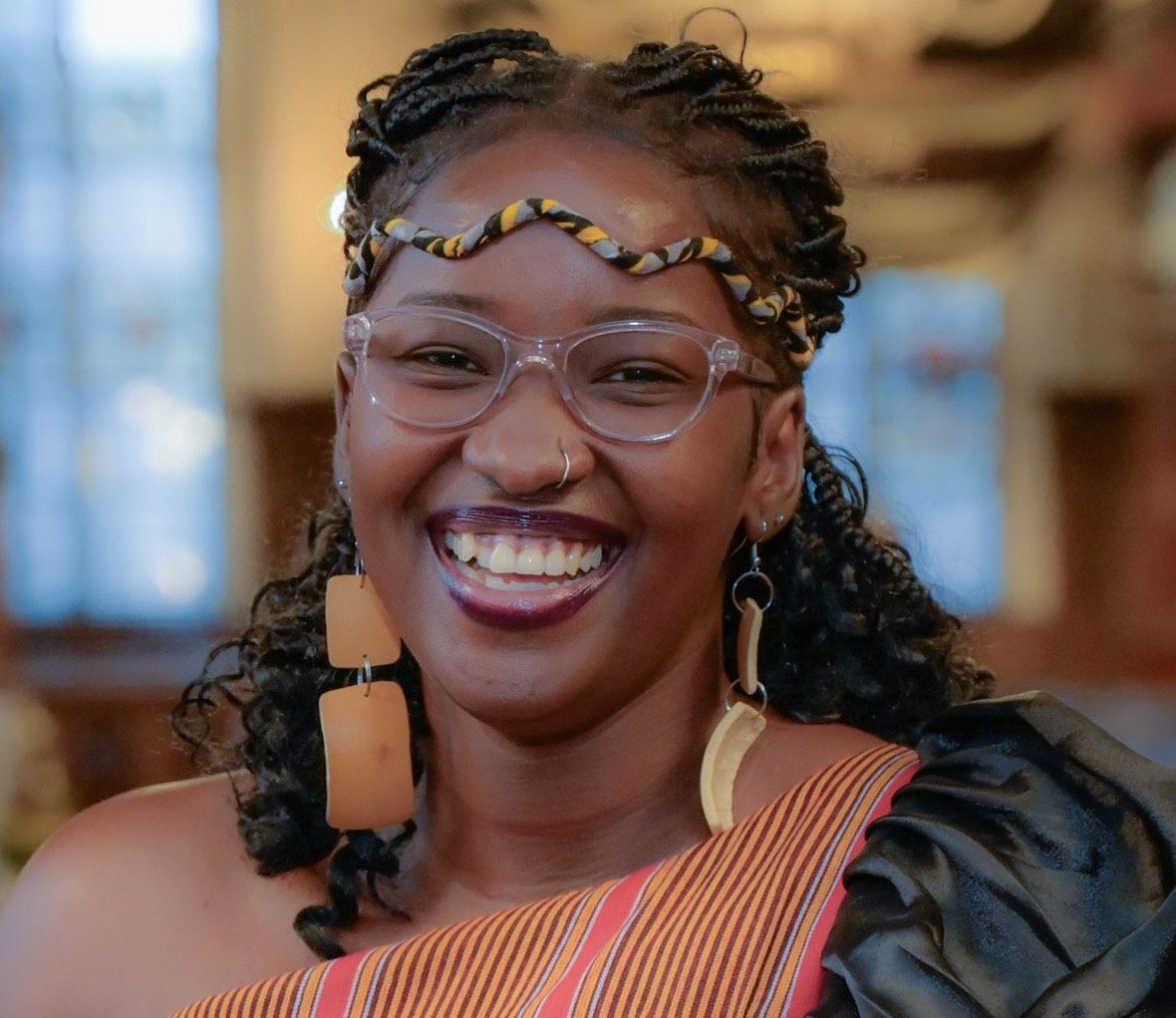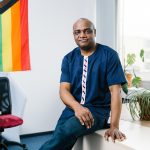Hamira Kobusingye is a climate activist based in Uganda and the founder of the organisation Climate Justice Africa. In 2023, she received the Bremen Solidarity Prize for Climate Justice. In conversation with denkhausbremen Hamira Kobusingye talks about her climate activism in Uganda, the importance of climate education on grassroots-level and her fight against a new oil pipeline project (Photo: Bremen Senator Press Department).
denkhausbremen: What does climate justice mean to you?
Hamira Kobusingye: When I envision climate justice, I see a world where no one’s life is valued more than another’s. Even today, African communities are exploited by the Global North, particularly regarding investments in oil fields. A glaring example is the long-lasting impact of an oil spill from a Shell pipeline in the Niger Delta, which has left residents with severe air, water, and soil pollution. Additionally, children in regions like the Congo are forced into labor to mine cobalt, which is then used to manufacture electric cars in Europe. This exploitation must end immediately; it is fundamentally unjust. Everyone deserves the right to a good life.
To me, climate justice also means that each community should have its own unique solutions for reducing emissions, transitioning to sustainable energy production, and achieving economic growth simultaneously. Climate justice means reducing inequalities in the social, economic and environmental sphere.
Let’s start from the beginning. What motivated you to become a climate activist?
Before I joined the fight against the climate crisis, I was deeply involved in empowering women. Growing up without a father, I witnessed firsthand the sacrifices my mother made to ensure I had opportunities in life. Many of my female friends were forced into early marriages, became young mothers, and were deprived of education. This motivated me to join a project aimed at helping young women, particularly single mothers, to grow their own vegetables. This initiative was designed to improve their financial situation by allowing them to sell their crops and use the money for education, health, and additional food for their children.
However, recurring droughts and floods repeatedly destroyed their crops, which was devastating. This heartbreaking experience led me to read and delve deeper into the climate crisis. I soon realised that climate change was the root cause of many issues in my community. This fueled my determination to spread awareness and inform more people about the impacts of climate change.
What did you do to achieve that?
In 2018, I began protesting on the streets of Kampala, holding up placards to raise awareness within my community about the climate crisis. At first, I felt like a drop in the ocean, and it was quite dangerous. There were times when the police intervened, forcing me to flee. Protesting in Uganda is not the same as in Germany; some of my friends were even jailed for their activism.
I understood that change wouldn’t happen overnight, but I believed that if I could get a few people to read my placard, they could spread the information further. Over time, I have seen a significant shift in awareness among those around me. Many people now have a better understanding of the climate crisis and how deeply it affects every aspect of our lives.
Last year, you received the Bremen Solidarity Prize for Climate Justice – in a country like Germany, being one of the biggest polluters in the world. Isn’t there a kind of irony in it?
Indeed, it was a bittersweet moment for me. Winning the prize didn’t change the fact that Germany remains a major polluter, often delaying meaningful climate solutions and the phase-out of fossil fuels. This was evident in Lüzerath in January 2023. However, as a climate activist and representative of the Global South, I was grateful for the opportunity to speak before German politicians about our demands, such as appropriate climate financing.
It was encouraging to see political leaders in Bremen supporting climate activists and advocating for climate justice. This contrasts sharply with Uganda, where it is rare to find politicians who support our cause. In fact, we are often treated like adversaries, despite our goal of improving the lives of our fellow citizens. Additionally, the prize money has been useful in helping Climate Justice Africa to become officially registered as an NGO, which is a significant step forward for our organization.
What is Climate Justice Africa about?
Climate Justice Africa originated as an idea in 2020 and officially became an NGO during COP27 in 2022. As the founder, my mission has always been to raise awareness about climate change, promote sustainable development, and empower grassroots communities to advocate for real change and join a network of climate activists across Africa. This mission is of utmost importance to me.
For example, we run a capacity-building and skill-sharing program for communities and climate activists. We provide education on critical topics such as the Paris Agreement, the Loss and Damage Fund, and the workings of international climate negotiations. Additionally, we offer tailored solutions to help communities build resilience against climate change.
Climate education is essential—not only to ensure people receive accurate information but also to combat misinformation and encourage citizens to support politicians who prioritize the climate crisis. Through these efforts, Climate Justice Africa aims to create a knowledgeable and proactive community ready to tackle climate challenges head-on.
You are also active in fighting against the East African Crude Oil Pipeline Project, which is supposed to transport oil from Uganda to Tanzania.
Yes, this proposed pipeline is estimated to emit 35 million tons of CO2 annually. If this project proceeds, Uganda—already severely affected by climate change—would become a significant polluter. We cannot afford this, as we are already grappling with a climate crisis we did not cause. Uganda has immense potential for sustainable energy production through solar power, this should be our focus. Instead, amid an escalating climate crisis, our government has chosen to invest in fossil fuels. These investments do not benefit our people; rather, they ensure the supply of fossil fuels to Europe. This is truly shameful. Africa must stop serving the needs of the Global North and forge its own path towards a sustainable future. Otherwise, Western countries will continue imposing their environmentally destructive practices on us.
What are your main concerns regarding this planned pipeline?
I fear that people in Uganda and Tanzania will face the same devastating consequences as those in the Niger Delta. Having visited the region, I witnessed the horrific conditions that persist years after the oil disaster began. The local communities have been robbed of their livelihoods; they struggle to grow crops or catch fish because the land and water are contaminated with oil. Even breathing fresh air is difficult, prompting recommendations to buy air cleaners, which many cannot afford. Fresh air should be free; it is a fundamental human right. Instead, the people of the Niger Delta live with the constant fear that they might cough up blood or experience lung failure at any moment. This is a stark example of how billionaires, corporations, and major polluters dehumanize people for profit. Once they have extracted what they want, they pack up and leave, abandoning the affected communities to deal with the mess.
How can politicians from Germany support the fight for climate justice in the Global South?
I could suggest that they push for speeding up in climate action and invest in the Loss and Damage Fund, but the truth is—they already know all this. This is why we, as young people and members of civil society, must unite and keep advocating for urgent climate measures. Real change is coming from grassroots efforts and individuals making a difference in their communities. German politicians can support this by providing resources, such as laptops, to grassroots activists. This might seem simple, but it would really help. With access to technology, these activists can educate themselves, follow climate negotiations online, and use social media to network and advocate for climate action within their communities.
Seems like your hope lies in the civil society, not in political leaders…
Yes. To be honest, I am really disappointed with most politicians, as many of their promises are empty. Throughout the past year, I felt depressed and anxious. There is so much injustice in this world, it is frustrating. Most politicians do not treat climate change as the crisis it is, even though its impacts are already surrounding us. If we do not act now, more people around the world will suffer and die from its effects. Looking at Small Island Developing States (SIDS) like Tuvalu, Mauritius, Kiribati etc. their current situation is telling us to act now or a whole civilization, culture and heritage might be extinct.
So, what is the alternative? Real change is never easy, and investing in climate protection and a socio-ecological transformation will require significant financial resources. However, taking a proactive stance and striving for a sustainable future for everyone is, in my opinion, far better than passively waiting for a climate catastrophe to unfold.







